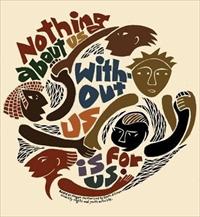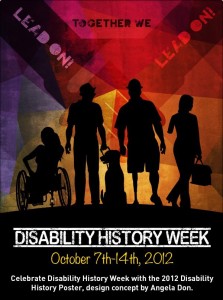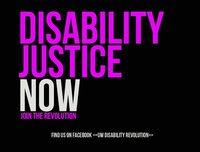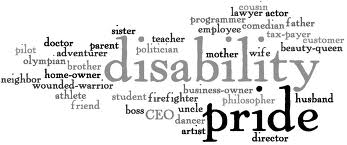What It Means To Be A Help Object
I’ve been having a conversation with my friend Julie Rose. Julie has just been diagnosed with Lupus and has become visibly disabled. In response to my piece about disabled people as help objects, she wrote to me and said that she really couldn’t wrap her mind around what being a help object meant until she began to navigate the world with a visible disability. Now she understands it excruciatingly well.
What Julie has to say is so right and so clear that, with her permission, I am sharing it here. She writes:
Before the last few days, I was confused by the term “help object.” It took me less than 48 hours of being a “public cripple” to know what it means.
So far:
1. It means that if you offer me help and I don’t accept it, I’m an ungrateful, ungracious asshole. It doesn’t matter if what you are offering me is useful or not. It doesn’t even matter if what you are offering might be life threatening to me. I must say, “thank you” and accept it with total aplomb.
2. I can’t have a sense of humor. If I do, you will be confused and think I’m fine and feel duped by my asking for help. Therefore, I’m a scam artist, not a cripple.
3. Since I’m home bound, I must have nothing to do and no schedule, so you can barge in on me any time and you can also not show up or call when you have made a commitment to do so. After all, I’ll always be here, in bed, while you are busy with whatever a real life has to offer. I shouldn’t complain. Again, I’d be a whiner or an ungrateful asshole or both.
4. If you don’t follow through with what you promised you’d do, I must still be gracious and say “thank you.” I can’t say it put me out because in your eyes I have no life.
I don’t think I’ve read anything that has made the privilege of Ability quite so clear to me. This level of privilege is stunning. Privilege, in and of itself, isn’t something that one can escape, but it’s something that one can use well or badly. In the kinds of situations that Julie talks about, it’s being used badly.
To use it badly means to treat ill or disabled people as though we belong in some whole other category in which the rules of basic decency do not apply.
Do want to give help? Then ask what help is needed. Do you want to visit? Then ask what a good time might be and show up. Are you wondering how someone can have a sense of humor and be ill at the same time? Stop wondering and start believing.
I fundamentally do not understand why these are such difficult concepts. Do people suddenly lose their rights to be treated like human beings because our bodies change? No. We don’t. Why is this truth so hard to grasp?
© 2013 by Rachel Cohen-Rottenberg









julesinrose
9/3/2013 | 12:19 pm Permalink
Thank you, Rachel. I wanted to have an emotionally quiet day without tears, but now that’s not possible. I can’t begin to tell you how grateful I am to you. Without your witnessing, I have no idea how I could have made it through the last week. Thank you so much. I have the bravery to say to you “I refuse to be invisible” by telling you to use m real name, but I do not have the bravery to post this on my Facebook wall. The amount of people who will be insulted will be stunning. Well, not to us, I’m afraid.
Jesse the K
9/3/2013 | 6:51 pm Permalink
Thanks to both Rachel and julesinrose for singing that tune perfectly. I’m going to download this essay to my phone so I can explain this stuff to those who care about being clueful.
After 20 years with an evident disability, here’s one more rule about help objects: we can’t help you. When I hold the door for able-appearing you, you’re gonna freak. When I pay full price on the bus, you have to carefully explain that I don’t need to. When I volunteer to do anything, you doubt that I can do it (but won’t ask me directly).
julesinrose
9/4/2013 | 5:26 am Permalink
It makes me really happy, JesstheK, that you find my words helpful.
Funny thing though – I’ve been helping others for years. No one doesn’t let me do it!!! What’s up with that? I more than kinda need some reciprocity now. I hear people tell my husband and I things like “I can’t possibly help you ’cause you’re so capable and self sufficient and smart. . .” I believe they think this is some sort of compliment, but I hear it as a big cop out! I’ve heard we are “intimidating!” You oughta see us. Two unusually short middle aged people. You’d think we were ogres or something!!
Haddayr Copley-Woods
9/5/2013 | 11:17 am Permalink
I, too, am apparently no longer able to help. I recently got down an item from a tall shelf for a woman. The only reason I could was because of my crutches. My disability is what MADE ME ABLE TO HELP HER.
She refused to take the box.
Rachel Cohen-Rottenberg
9/5/2013 | 4:55 pm Permalink
Whoa. Not too much insistence on maintaining the pecking order there, eh?
Laura
9/7/2013 | 6:09 am Permalink
Thank you for writing this. I have posted the link on my blog (with attribution to you) so that the message can be shared further.
I know several people with visible physical disabilities and this puts to words what is often felt but left unspoken.
Laura